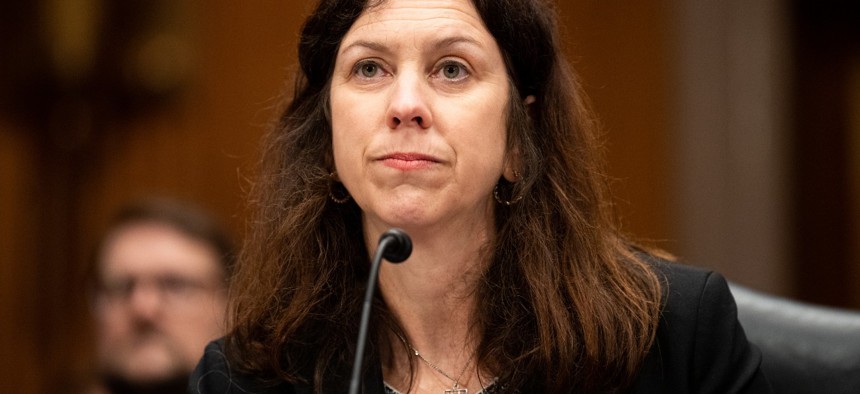
Colleen Shogan, nominee to be archivist of the United States, testifies during her confirmation hearing in the Senate Homeland Security and Governmental Affairs Committee on Tuesday. Bill Clark/CQ-Roll Call, Inc via Getty Images
Archivist Nominee Pledges to Address a Backlog That Stands in the Way of Veterans Getting Benefits
“Of utmost importance to me” is reducing the pandemic-induced pileup of records requests, Colleen Shogan told lawmakers in her second nomination hearing.
President Biden’s nominee to be archivist of the United States told lawmakers on Tuesday that if confirmed, her priorities would include reducing the backlog of over 300,000 veterans’ records requests and looking for opportunities to declassify older records.
Colleen Shogan, most recently a senior vice president and director at the White House Historical Association, testified for the second time before the Senate Homeland Security and Governmental Affairs Committee after the president re-nominated her in the new session of Congress.
“Of utmost importance to me” is working to reduce the COVID-19 pandemic induced backlog of military service members’ records at the National Archives and Records Administration National Personnel Records Center located in St. Louis, Shogan said. “Veterans need access to these records, so they can claim the benefits that they’re guaranteed.” The center has been working with the Veterans Affairs Department to take on this massive task.
If confirmed, Shogan said her first trip would be to St. Louis to observe operations at the records center and see what could be done to speed up the December 2023 deadline to reduce the backlog, as outlined in a recent plan required by the fiscal 2023 National Defense Authorization Act. The annual defense policy bill also gave NARA $60 million to address the backlog.
“As of February 13, 2023, the total count of unanswered requests for military service records at the [records center] stood at 404,000,” which includes backlogged and new ones, according to the plan, obtained by Government Executive. “This is a reduction of 200,000 or 33% from its peak of 604,000 in March 2022. Since April 1, 2022, the [records center] has responded to almost 1.1 million requests for military service records, including both new and backlogged records requests.” The number of unanswered, overdue records requests is about 338,000.

Since Shogan’s last appearance before the committee in September, special counsels have been appointed to look into the handling of classified documents by President Trump, following the FBI search of Mar-a-Lago over the summer, and President Biden, after a drip-drip of information about classified documents found in his home and former office space; classified documents were also found at former Vice President Mike Pence’s home in Indiana, and the archives asked representatives for former presidents and vice presidents from the last six presidential administrations to re-check their personal records for ones that should have been turned over. This has reignited conversations about over-classification.
Senators acknowledged that Shogan is not yet working at NARA, but still asked about the broader issues with over-classification.
She said that as she understands it, the federal agency that classifies information is responsible for declassifying such information, rather than a mandate from NARA, “but there is the National Declassification Center at the National Archives, located in Maryland, and, if I am confirmed, I plan to, of course, visit the National Declassification Center and also prioritize the…older records that are waiting for declassification.” She said that if confirmed, her work would include “figuring out how we can be most efficient in doing this and how we can strengthen relationships with those classifying agencies, those classifying entities, so that we are able to move some of these older documents through the process.”
The center was established by an executive order from President Obama in 2009 to streamline the declassification process and advance the public release of “historically valuable permanent records,” while also considering national security.
In addition to the center, there is also the Public Interest Declassification Board, an advisory committee established by Congress in 2000, the Information Security Oversight Office and the Interagency Security Classification Appeals Panel.
If confirmed, Shogan will also be tasked with overseeing the governmentwide transition to electronic recordkeeping for all permanent records, with limited exceptions. As outlined in a December memo from Debra Steidel Wall, acting archivist, and Shalanda Young, director of the Office of Management and Budget, agencies have until June 30, 2024 to take a series of actions on this.
“Government is not always considered nimble when it comes to innovation, but the National Archives can serve as a leader in its transition to a primarily digital future,” Shogan said. “This will require investing in the archives' talented workforce and making smart business decisions that will propel NARA forward.”
Wall has been acting archivist since May 2022, following the retirement of David Ferriero who was archivist over three presidential administrations, from November 2009 to April 2022. Shogan would be the first woman confirmed for the role. After her hearing in September, the committee failed to advance her nomination to the full Senate. Republicans accused her of being extremely partisan.
The Society of American Archivists, Council of State Archivists, American Historical Association and EveryLibrary (a political action committee for libraries) in the fall all urged her confirmation.







